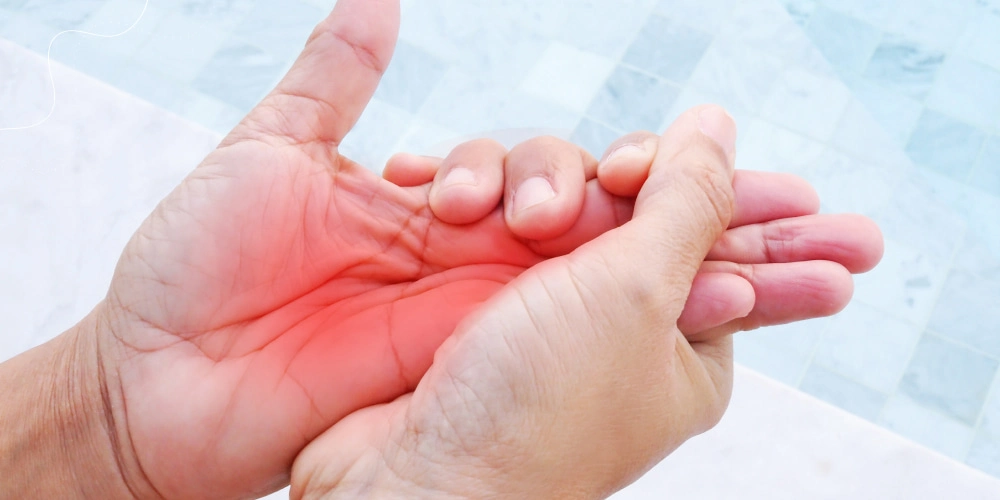
RF. Numb Hands: Is It Normal or a Sign of a Problem?
Experiencing numbness or tingling in your hands from time to time is fairly common, especially after waking up or keeping your arm in the same position for an extended period. However, when the sensation becomes frequent, persistent, or severe, it may indicate a deeper issue that requires medical attention.
This sensation is medically known as paresthesia, which includes symptoms such as tingling, numbness, or a “pins and needles” feeling. While occasional numbness is usually harmless and temporary, persistent paresthesia could be a sign of nerve dysfunction, circulatory issues, or chronic medical conditions.
In this article, we explore the common causes of hand numbness, when to seek medical attention, and the possible health conditions associated with it—based on scientific research and official health sources like the National Institutes of Health (NIH), Mayo Clinic, and the Cleveland Clinic.
What Causes Hand Numbness?
Hand numbness can stem from various factors, ranging from simple mechanical pressure on nerves to more complex systemic diseases. Below are the most common and clinically recognized causes:
1. Poor Posture or Pressure on Nerves
The most benign cause of hand numbness is temporary nerve compression, often due to poor posture. For instance, sleeping with your arm under your head or leaning on your elbow for a long period can compress peripheral nerves, temporarily cutting off nerve signals.
According to the Cleveland Clinic, this type of paresthesia typically resolves on its own once pressure is relieved and circulation returns to normal.
Source: Cleveland Clinic – Paresthesia Overview

2. Carpal Tunnel Syndrome (CTS)
One of the most common medical causes of hand numbness is carpal tunnel syndrome. This condition occurs when the median nerve, which runs from the forearm into the palm, becomes compressed at the wrist.
Carpal tunnel syndrome is particularly prevalent among people who perform repetitive wrist movements, such as typing, sewing, or using vibrating tools. Symptoms may include:
- Numbness or tingling in the thumb, index, and middle fingers
- Hand weakness
- Difficulty gripping objects
According to the Mayo Clinic, early diagnosis and intervention can help manage symptoms and prevent long-term nerve damage.
Source: Mayo Clinic – Carpal Tunnel Syndrome
3. Ulnar Nerve Entrapment (Cubital Tunnel Syndrome)
This condition affects the ulnar nerve, which passes behind the elbow and into the hand. Pressure on this nerve, especially near the elbow (cubital tunnel), can cause:
- Tingling or numbness in the ring and pinky fingers
- Weak grip
- Hand clumsiness
Ulnar nerve entrapment often worsens when the elbow remains bent for prolonged periods.
Source: Johns Hopkins Medicine – Ulnar Nerve Entrapment

4. Poor Circulation and Vascular Conditions
Hand numbness may also occur due to reduced blood flow, especially in individuals with cardiovascular issues. Conditions like peripheral artery disease (PAD) or Raynaud’s phenomenon can lead to intermittent numbness, particularly in cold environments or during stress.
In individuals with diabetes mellitus, poor circulation and nerve damage (diabetic neuropathy) can also contribute to numbness in the hands and feet.
Source: National Institute of Diabetes and Digestive and Kidney Diseases (NIDDK)

5. Cervical Radiculopathy (Pinched Nerve in the Neck)
Sometimes, numbness in the hands originates not from the hand itself, but from nerve root compression in the neck. This condition, called cervical radiculopathy, is often caused by:
- Herniated discs
- Degenerative disc disease
- Osteoarthritis in the spine
In such cases, symptoms may include numbness, tingling, or pain that radiates from the neck into the shoulders, arms, and fingers.
Source: American Association of Neurological Surgeons – Cervical Radiculopathy

6. Diabetic Neuropathy
For individuals with type 1 or type 2 diabetes, nerve damage due to high blood sugar levels over time can lead to peripheral neuropathy, a condition that often affects both the hands and feet.
Symptoms of diabetic neuropathy include:
- Tingling
- Burning pain
- Numbness or sensitivity
Regular glucose management and lifestyle modifications can help reduce the risk of developing neuropathy or slow its progression.
Source: Centers for Disease Control and Prevention – Diabetes and Nerve Damage

7. Vitamin Deficiencies
Deficiencies in certain vitamins, particularly B12, can impair nerve function and result in hand numbness or tingling. Vitamin B12 plays a critical role in nerve health, and prolonged deficiency can lead to permanent neurological damage if left untreated.
Common causes of B12 deficiency include:
- Poor dietary intake (especially in vegan diets)
- Pernicious anemia
- Malabsorption disorders
A simple blood test can identify a deficiency, and supplementation under medical supervision is typically effective.
Source: National Institutes of Health – Vitamin B12 Fact Sheet
When to See a Doctor
While occasional numbness in the hands may not be alarming, persistent or worsening symptoms should prompt a medical consultation. Seek medical attention if you experience:
- Frequent or chronic hand numbness
- Weakness or muscle atrophy in the hand
- Pain that radiates from the neck or shoulder
- Numbness accompanied by confusion or loss of coordination
Your doctor may recommend diagnostic tests such as nerve conduction studies, electromyography (EMG), or MRI scans to determine the underlying cause.
Source: Mayo Clinic – Numbness and Tingling

Conclusion: Numb Hands Can Be Harmless or a Warning Sign
In summary, numbness or tingling in the hands can result from temporary pressure or point to underlying health conditions such as nerve compression, diabetes, vitamin deficiency, or spinal disorders. While the occasional “pins and needles” sensation is often nothing to worry about, persistent symptoms warrant further evaluation.
If you’re experiencing recurring numbness, it’s best to consult with a healthcare provider. Early diagnosis and treatment can improve outcomes, prevent complications, and restore normal sensation and function.
Sources:
- Cleveland Clinic – Paresthesia
- Mayo Clinic – Carpal Tunnel Syndrome
- Johns Hopkins Medicine – Ulnar Nerve Entrapment
- National Institute of Diabetes and Digestive and Kidney Diseases
- American Association of Neurological Surgeons
- Centers for Disease Control and Prevention – Diabetic Neuropathy
- NIH Office of Dietary Supplements – Vitamin B12



